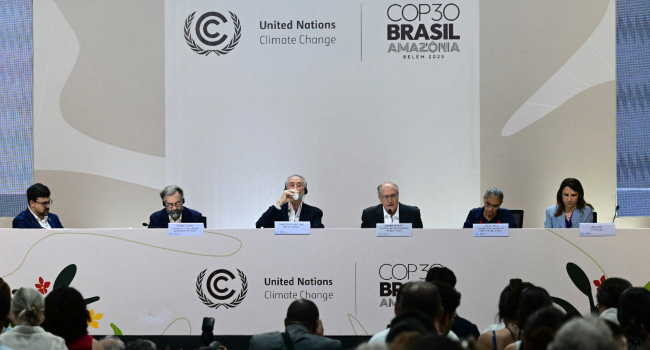After announcing its fast-tracked timeline, negotiators spent a sleepless night producing a first draft on trade measures, demands for greater finance for poorer nations, and the inadequacy of national carbon-cutting pledges.
Brazil’s Secretary for Climate, Energy and Environment at the Foreign Ministry Mauricio Lyrio; COP30 President Andre Correa do Lago; Brazil’s Vice President and Minister of Industry and Trade Geraldo Alckmin; Brazil’s Environment Minister Marina Silva; and COP30 CEO Ana Toni hold a press conference during the COP30 UN Climate Change Conference in Belem, Para state, Brazil, on November 17, 2025.
COP30 host Brazil pressed Tuesday for an early breakthrough at UN climate talks, with nations weighing a proposed deal that attempts to bridge major differences on fossil fuels, finance, and trade barriers.

Brazil wants an agreement reached by midweek, with President Luiz Inacio Lula da Silva expected to make an unexpected return on Wednesday to Belem, the host city in the country’s Amazon region, in a high-level bid to seal a deal.
After announcing its fast-tracked timeline, negotiators spent a sleepless night producing a first draft on trade measures, demands for greater finance for poorer nations, and the inadequacy of national carbon-cutting pledges.
“As always in this phase of the negotiations, this is a mixed bag,” EU climate chief Wopke Hoekstra told AFP in the corridors of the cavernous COP30 venue.

UK climate envoy Rachel Kyte said the draft “feels a little out of balance,” but hoped discussions with Brazil could yield a “stronger text.”
“The Brazilians have a very aggressive timeline. I think it’s putting delegates under a lot of pressure, but there’s a chemistry to COPs,” Kyte told reporters.
No rest was expected in Belem on Wednesday, with diplomats asked to work late into the night once again.
The quick turnaround of a clear first draft so early in the climate talks signaled that Brazil was confident of landing an agreement soon, veteran COP observers told AFP.

Asked at Tuesday’s final press conference whether Brazil hoped to finalize decisions on the toughest issues the next day, COP30 president Andrea Correa do Lago confirmed that was the plan, though it could happen very late in the day.
He also confirmed Lula would return to meet with some negotiating groups and participate in other activities in Belem.
“It would be a way of putting pressure on delegates to move quickly to resolve issues,” said David Waskow, international climate director at the World Resources Institute.
Among other points, the draft highlights the gulf between a broad coalition pushing for a roadmap to phase out fossil fuels and an opposing bloc led by oil-producing countries.

On Tuesday, more than a dozen climate ministers and ambassadors stood together on stage calling for stronger language in the final agreement on exiting coal, oil, and gas.
“The current reference in the text is weak, and it is presented as an option. It must be strengthened and adopted,” said Tina Stege, climate envoy from the Marshall Islands, joined by representatives from Sierra Leone, the UK, and Colombia.
The draft also proposes tripling financial assistance from wealthy countries to developing nations for climate adaptation by 2030 or 2035 — a key demand from poorer countries.
“Climate finance is not charity. It is a legal and moral obligation,” said Vanuatu’s climate change minister, Ralph Regenvanu.

Brazil aims to demonstrate that the world remains united in the fight against climate change, despite the United States skipping the summit and many nations juggling competing priorities.
“We must show the world that multilateralism is alive,” said Josephine Moote, permanent representative of Kiribati.
But Kenya’s climate secretary Deborah Mlongo Barasa said the obligation of wealthy nations to deliver promised financial assistance “remains the defining test of global solidarity.”
Hoekstra said there was “zero appetite” for revisiting the debate over climate finance — a contentious issue that turned acrimonious at last year’s COP29 in Azerbaijan.

He also rejected some of the draft’s proposals on trade concerns, as China leads a push against unilateral measures, particularly the EU’s carbon price on imports.
“We’re not going to be lured into a phony conversation about trade measures. Let’s call this what it is,” he said.
The marathon climate talks are scheduled to end Friday after nearly two weeks of negotiations, though past summits have frequently run overtime.




